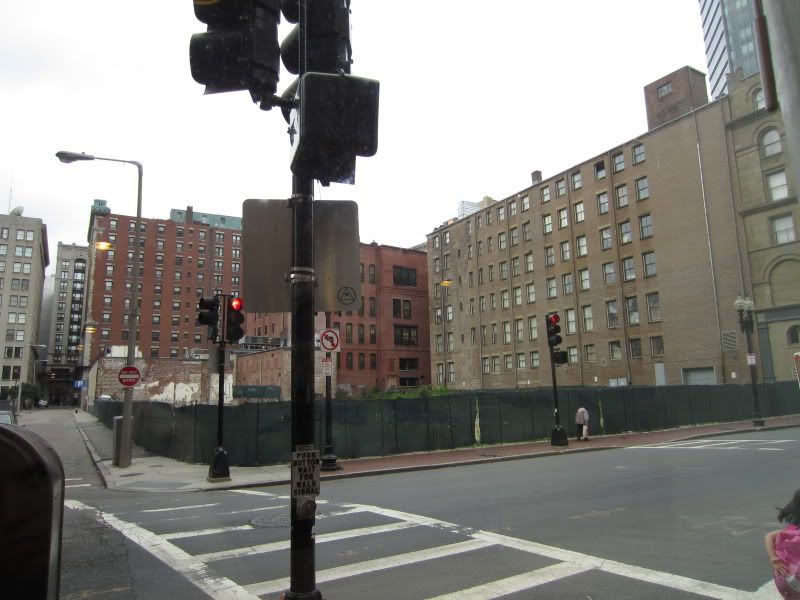What should we do about Borders?
Borders Group, Inc. is in the process of liquidating its holdings, selling off the entire inventory in its 399 bookstores before going out of business forever. Here in Boston, its Back Bay branch is already closed, and last week the Downtown Crossing store advertised a 10 percent closeout sale on books in its fiction collection, with discounts of 20 - 40 percent and more expected soon.
This news could not have come at a worse time for the Downtown Crossing (DTX) neighborhood. With the Filene’s hole in the ground just a block away, with the nearby 45 Province condo project less than a third sold, with the proposed One Bromfield apartment complex preparing to break ground, and with multiple retail vacancies leaving the area feeling at times like a ghost town, the neighborhood needs to at least hold its ground until the real estate market and economy improves. Otherwise, we might lose the opportunity to save our city’s main shopping district for as long as another generation.
The DTX Borders at 10-24 School Street includes 36,000-plus square feet of space with the bookstore on the first two levels (the chain’s largest) and separate business offices on the floors above – it’s a large building in a prominent location. (The building's owners can’t be happy losing their prime retail tenant, considering they paid $32.6 million for the property back in 2006, taking out a $24.45 million mortgage loan.)
Assessed at $8.4 million by the city of Boston, the property brings in $260,000 per year in taxes. So, it’s in all of our best interests that it doesn’t lie dormant for very long.
One building can’t be counted on to resurrect an entire neighborhood, but unfortunately, the opposite is true – all it takes is the demise of one building to tilt a neighborhood over the edge into urban blight. That’s what’s at risk here.
We need to ensure that, once Borders closes its doors, something else quickly takes its place. The question is: What should the Downtown Crossing Borders become?
I asked my friends on Facebook and Twitter for ideas. Here are their responses, including the clever, the sarcastic, the silly and the sublime.
Beer Garden
International Food Court
Jewelry District
Roller skating rink
Bigger, better hole (see Filene’s)
B&H photo store
Starbucks|FedEx|Kinko's with cubicles
Full-sized version of Pee-Wee’s Playhouse
Bordello
Redemption center
Movie theater / IMAX
College classrooms
Library (college or public)
Bookstore
Restaurant
Apple store
Performance space
Office space
Open market / flea market
Movie / TV studios
Boston History Museum
Boston Design Museum
Institute of Contemporary Art (ICA) Downtown
IKEA
CVS
Kmart
Bank
A new city hall
Trader Joe’s
Multi-level burrito place
Amazon Kindle store (too soon?)
Six-story winding slide
An ethnic-food sensitive Whole Foods
A newspaper office
Pub with good beer and live music
Reopened Filene’s Basement
All of the above are great ideas (although, with varying degrees of practicality). They show that Boston residents feel engaged and involved, that there are plenty of people who want our downtown neighborhood to improve and our city to succeed.
An out-of-town friend suggested, “They should make DTX more of a promenade-like area with higher-end shops and boutiques, cafés, etc.”
Easier said than done, although many cities have had success with this sort of thing, including Third Street Promenade in Santa Monica and Lincoln Road in South Beach, Miami.
Meanwhile, the Boston Herald came up with the concept of a “Digital Alley”.
There’s precedence for this idea of turning a rundown neighborhood into a digital district. Twitter, the online messaging service, is moving into an abandoned furniture showroom building on San Francisco’s Market Street, occupying hundreds of thousands square feet of space.
SF city officials persuaded Twitter to stay local “by proposing a six-year exemption on the city's 1.5 percent payroll tax for new employees of companies located in the mid-Market and Tenderloin neighborhoods,” according to SF Gate.
I’ve never been fond of tax credit gimmicks, so I can’t recommend making this kind of offer, here in Boston. It leads to all types of trouble. They’ve already discovered this in San Francisco, where other internet companies are urging officials to make payroll-tax changes “that would benefit companies no matter where they are located in the city,” according to the Wall Street Journal. But, it’s an interesting idea.
Hopefully, Boston’s leadership is paying attention to this dire situation and is willing to put as much effort into Downtown Crossing, a neighborhood that already exists, as it is in the “Innovation District” which, last time I checked, was still a bunch of parking lots.
And, hopefully, our elected officials are willing to help businesses that are already located in Boston as well as companies that have to be persuaded to move here with offers of buckets of cash in return.
If Boston Mayor Thomas M. Menino is going to continue giving our money away to private developers (which seems probable), he could do worse than using it to encourage economic development and growth in a neighborhood such as Downtown Crossing.
What do you think should be put in the Borders' space? And what thoughts do you have about what's going on in Downtown Crossing?




